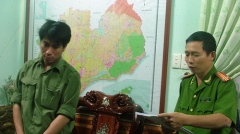Workers at Japan's stricken nuclear plant on
Thursday pumped nitrogen into a crippled reactor in a bid to prevent a
possible explosion and contain the world's worst atomic accident for 25
years.
With the crisis at the Fukushima Daiichi plant approaching the end of its fourth week, operator Tokyo Electric Power said it was concerned a build-up of hydrogen gas at the No. 1 reactor could cause another explosion at the site.
The fresh challenge underscored the fragility of the situation at the stricken plant, after rare progress was seen Wednesday when workers plugged a hole spewing highly radioactive water into the ocean.
TEPCO officials say hydrogen building up in the housing around reactor No. 1 could mix with incoming oxygen, creating an explosion.
Experts say the risk of a detonation could rise as the nuclear fuel rods cool and as the steam inside the containment vessel condenses into water, reducing pressure inside the unit and drawing air in through cracks.
The move came as an assessment by the US Nuclear Regulatory Commission dated March 26 emerged, citing persistent and growing threats at the plant, including the risk of gas build up and explosions.
Workers began pumping in nitrogen, an inert gas abundant in the atmosphere, which they hope will displace the oxygen. The process to inject 6,000 cubic metres (210,000 cubic feet) will take around six days, TEPCO said.
"Workers started injecting nitrogen gas at 1:31 am (1631 GMT Wednesday). Since the pressure level went up, they confirmed that the gas was successfully going into the container," said a spokesman with Japan's nuclear safety agency.
TEPCO said it was also planning to inject nitrogen gas into reactors number 2 and 3 as a protective measure.
In the days after the earthquake and tsunami crippled the plant, large explosions resulted from hydrogen accumulation near the reactors, damaging the outer buildings housing them.
A 20-kilometre (13-mile) exclusion zone around the plant has forced tens of thousands of people to evacuate.
The plant has emitted radioactive material into the air, contaminating drinking water and farm produce, with radioactive iodine above legal limits detected in vegetables, dairy products and mushrooms.
Nuclear concerns continue to distract from the March 11 disaster that has left more than 12,000 dead and over 15,000 missing.
Markets reacted positively to the latest efforts to stabilise the plant.
TEPCO shares gained 1.18 percent to 341 by noon Thursday, having hit all-time closing lows this week amid concerns its faces a huge compensation bill with the situation at its stricken nuclear plant still unresolved.
Shares in Japan's biggest utility have lost around 84 percent of their pre-earthquake March 10 closing value. Prime Minister Naoto Kan last week moved to dismiss speculation the firm may be nationalised.
On Wednesday, the government promised compensation for the fishing industry, a day after increasing unease about the contamination led it to impose a legal limit for radioactive iodine in seafood for the first time.
Levels of radioactive iodine-131 and caesium in seawater immediately outside the plant have spiked, stoking fears over marine life in a country whose diet depends heavily on seafood.
TEPCO has also continued a separate operation to release 11,500 tonnes of lower-level radioactive water into the sea to free up urgently needed storage space for water so toxic that it is hampering crucial repair work.
The water dumping has angered the fishing industry and on Wednesday Ikuhiro Hattori, the head of Japan Fisheries Cooperatives, visited the company's headquarters to protest.
The triple crisis has slashed the number of foreigners travelling to Japan's two main airports by two-thirds to a daily average of just over 5,000.
The wider economic impact from the quake, tsunami and nuclear emergency is likely to drive the country into recession in the coming months, many economists now say.
With the crisis at the Fukushima Daiichi plant approaching the end of its fourth week, operator Tokyo Electric Power said it was concerned a build-up of hydrogen gas at the No. 1 reactor could cause another explosion at the site.
The fresh challenge underscored the fragility of the situation at the stricken plant, after rare progress was seen Wednesday when workers plugged a hole spewing highly radioactive water into the ocean.
TEPCO officials say hydrogen building up in the housing around reactor No. 1 could mix with incoming oxygen, creating an explosion.
Experts say the risk of a detonation could rise as the nuclear fuel rods cool and as the steam inside the containment vessel condenses into water, reducing pressure inside the unit and drawing air in through cracks.
The move came as an assessment by the US Nuclear Regulatory Commission dated March 26 emerged, citing persistent and growing threats at the plant, including the risk of gas build up and explosions.
Workers began pumping in nitrogen, an inert gas abundant in the atmosphere, which they hope will displace the oxygen. The process to inject 6,000 cubic metres (210,000 cubic feet) will take around six days, TEPCO said.
"Workers started injecting nitrogen gas at 1:31 am (1631 GMT Wednesday). Since the pressure level went up, they confirmed that the gas was successfully going into the container," said a spokesman with Japan's nuclear safety agency.
TEPCO said it was also planning to inject nitrogen gas into reactors number 2 and 3 as a protective measure.
In the days after the earthquake and tsunami crippled the plant, large explosions resulted from hydrogen accumulation near the reactors, damaging the outer buildings housing them.
A 20-kilometre (13-mile) exclusion zone around the plant has forced tens of thousands of people to evacuate.
The plant has emitted radioactive material into the air, contaminating drinking water and farm produce, with radioactive iodine above legal limits detected in vegetables, dairy products and mushrooms.
Nuclear concerns continue to distract from the March 11 disaster that has left more than 12,000 dead and over 15,000 missing.
Markets reacted positively to the latest efforts to stabilise the plant.
TEPCO shares gained 1.18 percent to 341 by noon Thursday, having hit all-time closing lows this week amid concerns its faces a huge compensation bill with the situation at its stricken nuclear plant still unresolved.
Shares in Japan's biggest utility have lost around 84 percent of their pre-earthquake March 10 closing value. Prime Minister Naoto Kan last week moved to dismiss speculation the firm may be nationalised.
On Wednesday, the government promised compensation for the fishing industry, a day after increasing unease about the contamination led it to impose a legal limit for radioactive iodine in seafood for the first time.
Levels of radioactive iodine-131 and caesium in seawater immediately outside the plant have spiked, stoking fears over marine life in a country whose diet depends heavily on seafood.
TEPCO has also continued a separate operation to release 11,500 tonnes of lower-level radioactive water into the sea to free up urgently needed storage space for water so toxic that it is hampering crucial repair work.
The water dumping has angered the fishing industry and on Wednesday Ikuhiro Hattori, the head of Japan Fisheries Cooperatives, visited the company's headquarters to protest.
The triple crisis has slashed the number of foreigners travelling to Japan's two main airports by two-thirds to a daily average of just over 5,000.
The wider economic impact from the quake, tsunami and nuclear emergency is likely to drive the country into recession in the coming months, many economists now say.
bangkokpost


 4:00 PM
4:00 PM
 Trung
Trung


 Posted in:
Posted in: 





















